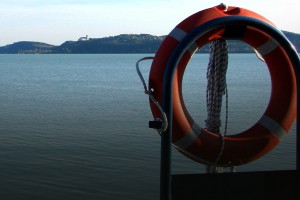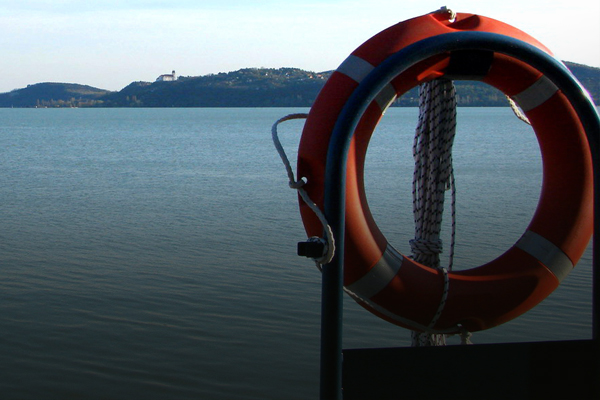
I’m using this analogy to help us think about the nature of the Church in America so we can be more focused in our efforts to make it better. I believe the Church is our best and last hope. It has been the often unrecognized foundation of our culture, the unsung (and maligned) hero responsible for much of what we take for granted as a nation and a people. As skepticism, hedonism and nihilism grow in our country, Christianity has the opportunity to meet the challenge or shrink from the fight. I believe we must renew the life and role of the mind in Christendom if we expect to have a continuing impact on our culture. And that’s where I think my analogy may illustrate the nature of the challenge we face. Let me describe two kinds of ocean vessels and you tell me which one sounds more like the Church today:
The Nature of Cruise Ships
Luxury cruise liners are large. In fact, most people who take vacation cruises seek the largest ship possible. Bigger is usually considered better. Cruise ships are tailored to human indulgence; they are designed to entertain. They offer the best food and nearly every kind of creature comfort possible. Cruise ships are largely self-contained and inwardly focused. You can get everything you want without ever leaving the boat. They navigate the waters alongside a variety of cultures and geographic locations, and their passengers can enjoy these locations as passive observers and visitors. They don’t have to get off the ship if they don’t want to, and even if they do, they get to return to the safety and comfort of the ship at the end of the day. There is no urgency on a cruise ship. In fact, most passengers of cruises want the trip to slow down. They want to relax and take their time. Passengers on cruise ships want to escape and disconnect from their regular lives so they can focus on themselves and enjoy the trip. On cruise ships, the paying customer is at the center of the experience. It’s all about the passengers; their happiness is all that matters. For a cruise ship to be successful, it must simply meet the desires and needs of its customers. At the end of a trip, the passengers will feel satisfied if they had a good time.
The Nature of Rescue Boats
Rescue boats are nimble and small. In fact, the smaller the vessel, the better able it will be to navigate hostile waters to accomplish its mission. Rescue boats are designed and equipped for a purpose; they are utilitarian and less concerned about comfort than function. They are designed to engage the world around them. They are outwardly focused; concerned more about the people they will rescue than the creature comforts of the rescuers. Rescue boats don’t have restaurants or movie theaters or massage parlors. They are designed specifically to serve those who aren’t on the boat. They don’t simply cruise alongside the world around them, they actively engage those in need. Rescue boats aren’t designed to carry passengers on long trips; they’re designed to deliver rescuers to a world in need. In fact, there are no passengers on rescue boats, only staff. Everyone has a job to do and a role to play. There is a sense of urgency, purpose and mission. Everyone knows where they fit and what they are trained to do. On rescue boats, fast is better than slow, mission is more important than comfort, and the needs of those off the boat are more critical than the desires of those who are on it. For a rescue boat to be successful, it must be able to engage the world tactically and effectively. At the end of the trip, the staff will likely be exhausted but satisfied they did something significant and worthy.
Now let me be clear about something here as I analogize the Church to one of these two vessels. I am not against large churches. As a skeptic, I first examined the gospels in the context of a huge church, and after becoming a Christian I eventually served on the staff there. I continue to engage and partner with large churches all the time and I am often impressed by their activity, mission and passion. Not all large ships are cruise ships and not all rescue boats are small. I’ve been involved with many large churches specifically designed as rescue boats. It’s all about the attitude and mission of the church, and much of this comes down to the leadership and vision of the pastor. I’m talking more about the Church with a capital “C”: the Church in America at large, including local churches of all sizes. Have we become self-focused and oblivious to the world around us? Are we more concerned about our comfort than our character? Have we become a monolithic sub-culture more concerned about our selfish desires than the needs of others? Are we equipped to rescue the lost with the Gospel of Christ? Are we nimble and responsive? This may not be the situation where you are locally, and if it isn’t, you’re in a good place. But I think these are important questions to ask as a family, and I bet as you read the description of these two vessels, you recognized the similarities between the cruise ship and the Church in America. Have we become a monolithic sub-culture more concerned about our selfish desires than the needs of others? Are we equipped to rescue the lost with the Gospel of Christ? Share on X
We can change that if we want to. It’s going to require us to recognize the urgency of our situation and to see the value in training rather than teaching. We must embrace a reasonable faith and be ready to give the reason for the hope we have in Jesus. There isn’t much room left for an accidental, unexamined, passive Christian faith. If Christianity is true, it’s time to treat it with the respect it deserves as we engage our devolving culture with the urgency it requires. Is the Church a cruise ship or a rescue boat? We have to answer this question honestly so we can change the course of this ship one degree at a time.

J. Warner Wallace is a Dateline featured Cold-Case Detective, Senior Fellow at the Colson Center for Christian Worldview, Adj. Professor of Christian Apologetics at Talbot School of Theology, Biola University, author of Cold-Case Christianity, God’s Crime Scene, and Forensic Faith, and creator of the Case Makers Academy for kids.
Subscribe to J. Warner’s Daily Email
J. Warner Wallace is a Dateline featured cold-case homicide detective, popular national speaker and best-selling author. He continues to consult on cold-case investigations while serving as a Senior Fellow at the Colson Center for Christian Worldview. He is also an Adj. Professor of Christian Apologetics at Talbot School of Theology, Biola University, and a faculty member at Summit Ministries. He holds a BA in Design (from CSULB), an MA in Architecture (from UCLA), and an MA in Theological Studies (from Gateway Seminary).
































